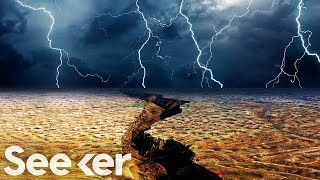Hey guys Matt here for Science or Fiction.
嘿,大家好!欢迎收看Science or Fiction,我是马特。
Don't you just get tired of seeing pseudoscience plastered all over the internet like it's actually true?
对于伪科学遍布全网,并且还(装得)跟真的一样这事,你是否感到厌倦?
Storms triggering earthquakes? Hahaha, that's so dumb--what a crackpot, flat earth, non-scientific headline!
引发地震的风暴?哈哈哈,太蠢了——真是个疯子,地球是平的,非科学的标题!
What kind of basement blog would...? Can certain weather really cause earthquakes?
什么样的地下室博客会...?真有某些天气会引发地震吗?
Is there such a thing as "earthquake weather?" CBS SF Bay Area reported: No.
有没有像“地震天气”之类的东西?哥伦比亚广播公司旧金山湾区报道:没有。
On the other hand, The California Department of Conservation said: Also no,
另一方面,加利福尼亚(环境)保护部说,也没有,
and they expanded by saying "Earthquake weather" is a common misconception dating back to ancient Greece.
他们还说,“地震天气”这个错误概念很常见,并可追溯至古希腊时期。
Ha, nice job, Socrates. And the U.S. Geological Survey said earthquakes are statistically as likely to occur in hot weather as cold or rainy weather.
哈,干得漂亮(讽刺),苏格拉底。美国地质调查局说在炎热天气与寒冷或下雨天气,地震的统计发生概率相同。

So basically no, no, and no. So I guess that settles it. Short video this time.
所以基本上不,不,不。所以我想这个问题解决了。来看个短视频。
There are NO legitimate sources claiming weather affects earthquakes, EXCEPT this New York Times article.
除了这篇纽约时报文章,天气影响地震的说法,尚未有合法来源证实。
Nature, and Newsweek, and National Geographic? What's going on?
那《自然》、《新闻周刊》和《美国国家地理杂志》呢?到底怎么回事?
First, a little middle-school refresher on earthquakes: Earthquakes are caused when the slowly moving tectonic plates that cover the earth shift to the point that the rocks between them--
首先,稍微复习一下中学的地震概念:覆盖地球缓慢移动的构造板块移动到一定程度时,会导致板块之间的岩石——
known as a fault-- break and cause seismic waves that ripple across the ground, which we feel as an earthquake.
也就是人们熟知的断层——破裂并形成波及地面的地震波,也就是我们感知到的地震。
Now, what about those headlines and the weather connection?
现在,那些头条新闻以及地震与天气之间的关联怎么说呢?
Well, the New York Times reported that the sudden plummeting of air pressure--which can happen when a storm quickly moves in
《纽约时报》报道说,风暴迅速移动时,空气压力会突然下降,
--causes underground water and air to rush toward the surface.
导致地下水及空气冲到地表。
This potentially reduces friction between tectonic plates, possibly making an earthquake more likely.
这可能降低了板块之间的摩擦,可能诱使地震易发。
The New York Times points to part of a study done in Taiwan, which is one of the most seismically active regions in the world.
纽约时报指出了台湾进行的一项研究(部分内容)。台湾是世界上最活跃的震区之一。
The researchers found a very strong correlation between typhoons and tiny, miniature earthquakes called "slow quakes,"
研究人员发现台风和轻微地震之间有很强的相关性。这种地震称为“慢地震”,
which may have a role in reducing the grinding pressure between tectonic plates, you know, like a chaperone between high schoolers at prom.
它可能会降低地壳构造板块之间的摩擦力,你知道,就像高中生毕业舞会上的伴侣。
Anyway, the pressure from the typhoons appeared to be enough to trigger a fault that was already under strain, resulting in a tiny slow quake.
无论如何,来自台风的压力似乎足以触发一个断层,而这个断层本已经承受了压力,从而导致一次微小的缓慢地震。
In addition a researcher who studied the past 50 years of Taiwan's weather and earthquake records,
此外,一位研究人员研究了过去50年台湾的天气及地震记录,
found that earthquakes of a magnitude 6 or higher were 5 times more likely to occur within 4 years of a major storm.
发现一场大风暴发生后的4年内,震级6级及以上地震的发生概率为5倍以上。
This is possibly in part because storm-caused erosion removes pressure from atop faults and allows the faults to shift faster.
这可能部分是因为风暴造成的侵蚀消除了断层顶部的压力,从而使断层转移得更快。
So, weather may actually affect earthquakes. It's so crazy that that's not crazy. Kind of cool.
因此,天气实际上可能影响地震。这太疯狂了,以至这实际上并不疯狂。有点意思。
Now, it's important to note that there doesn't appear to be more or fewer earthquakes because of weather.
重要的是要注意,现在似乎并没有因为天气,增加或减少地震发生的次数。
Weather can only possibly shift the earthquake timeline a little at most--not nearly enough to be predictive of future earthquakes.
天气最多只可能会对地震发生的时间产生些微影响——但几乎不足以对未来的地震做出预测。
And these studies so far are not conclusive. Sorry Socrates.
这些研究至今还尚无定论。对不起苏格拉底。
But if they were, that truly would be groundbreaking. I stand by this pun.
但如果真是这样的话,那真的是破天荒的了。我支持这个双关语。
Now if you're someone who's unhappy that science is still perfecting how to predict earthquakes,
如果你对科学还在不断完善地震预测一事不太高兴(有点遗憾),
you may be pleased to watch this video on new methods for predicting volcanic eruptions.
也许你会很高兴看到这段关于预测火山爆发新方法的视频。
Don't forget to subscribe before you split, and be sure to keep coming back to Seeker for more videos.
结束前,(我想说)欢迎订阅,并收看更多视频。











